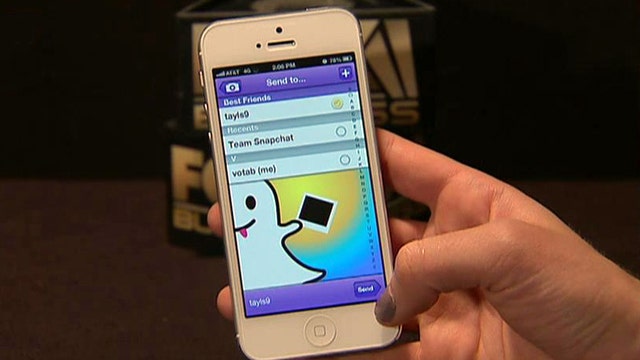This is a rush transcript from "Your World," October 13, 2014. This copy may not be in its final form and may be updated.
STUART VARNEY, GUEST HOST: Hacking into those selfies. Only, this time, it wasn't celebrities who were the target, but kids.
Thousands of photos featuring minors were stolen from Snapchat, an app that allows users to send photos with the understanding they will be deleted within seconds.
So now those pictures could be anywhere. A reason why parenting expert Tammy Gold says you have got to watch your kids' every move, but mom Lyss Stern says at some point you need to treat your kid like an adult.
All right, Lyss, let's go to you first.
LYSS STERN, FOUNDER, DIVALYSSCIOUS MOMS: Sure.
VARNEY: At what age do you start treating kids like adults and not look over their shoulder at everything they're doing online?
STERN: All right.
Well, I have a 10-year-old and a 7-year-old. And I'm looking over their shoulders because I need to know what is going on and I need to monitor what is happening. I know that some people would say, well, you know what, that's being a little bit too much. That's harsh. He's already 10 years old.
But you know what? I think it's a parent's responsibility at all ages to know exactly what is going on, especially with social media. That's one of our jobs, on top of everything else today, is to know what our kids are doing and what they're not doing.
VARNEY: OK.
STERN: And a perfect example with this -- with what happened here is I try to explain to my son anything that you put out there, if you put out a picture that's not appropriate, there is a way, even if you press delete, that somehow that picture down the road might come back and find you.
VARNEY: Sure. Sure.
STERN: And these are things that these children need to know.
VARNEY: But you have got an age -- you have got an age limit where you will sort of say, all right, OK, you're on your own, you're an adult.
But you have no such age limit, right?
TAMMY GOLD, FOUNDER, GOLD PARENT COACHING: Well, I believe until 18.
VARNEY: Eighteen.
GOLD: And, again, as a therapist, mine all goes back to psychology.
The prefrontal cortex of the brain for an adolescent is not grown until 21. And that piece controls everything in regard storm impulse control, really thinking things through, accountability.
VARNEY: Understood. Yes. Well...
(CROSSTALK)
GOLD: So a 12-year-old on Snapchat has no ability cognitively to understand this risque picture could harm me in some way.
(CROSSTALK)
VARNEY: Would you ban -- but would you ban Snapchat totally?
STERN: Yes.
VARNEY: And I ask that because...
STERN: Yes, I would. My kids don't have it and they're not getting it.
VARNEY: ... there's this feeling for the teens and youngsters involved that you're OK, you can send a picture because it disappears. It's a false sense of security.
(CROSSTALK)
STERN: It doesn't really disappear.
VARNEY: So would you ban Snapchat for your kids?
STERN: One hundred percent. My children can't have Snapchat.
VARNEY: Tammy, would you ban it?
GOLD: My 9-year-old has nothing. So, I'm a big, bad
(CROSSTALK)
GOLD: I have nothing.
STERN: Oh, so am I. My 10-year-old tells me I'm terrible. He doesn't have Instagram. He doesn't have Facebook, and there are reasons that he doesn't have these.
GOLD: I love the connectability. If you have an isolated child who wants to connect with their friends.
With Snapchat, they can take a screen-shot and that picture doesn't really disappear.
STERN: Correct.
GOLD: For some people, it does, but for tech-savvy people who can have a child that has an inappropriate picture that they send to a boyfriend and thinks it's gone and they have it forever...
(CROSSTALK)
VARNEY: Try the other side of the coin entirely. Supposing a parent is a flat-out libertine, and says, right, get on with it. Make the mistakes. Here's the mistakes you can make, don't do it, but get on with your life. What do you say to that? Would you say that is -- is that irresponsible?
GOLD: The whole thing with parenting is too often we reprimand them after the fact.
STERN: Yes.
GOLD: What parents need to do is get ahead of it, saying, you can be on this, but...
(CROSSTALK)
VARNEY: But you're monitoring it all. You're not allowing them to make any mistakes. You are monitoring it to the age of 18.
(CROSSTALK)
STERN: Unfortunately, though, you have to. You have to today monitor this. This cannot be just a free-for-all.
In fact, just going back to a conversation we were having before with nannies, some people -- most people should give them a contract ahead of time. Now, same thing with technology and children. If you want your child to really understand what's going on, there needs to be rules and regulations and there needs to be some kind of contract between you, the parent, and the child.
GOLD: Would you monitor your 16-year-old's bank account, your 18-year-old's bank account before college? If you're monitoring their bank account, which could harm them way less than, God forbid, a picture that puts them in a horrible situation if, God forbid, it's out there forever and passed around, take a peek at it.
VARNEY: Out of time.
Tammy -- Tammy, Lyss, we appreciate it. Thank you very much, indeed.
STERN: Thank you.
GOLD: Thank you.
Content and Programming Copyright 2014 Fox News Network, LLC. ALL RIGHTS RESERVED. Copyright 2014 CQ-Roll Call, Inc. All materials herein are protected by United States copyright law and may not be reproduced, distributed, transmitted, displayed, published or broadcast without the prior written permission of CQ-Roll Call. You may not alter or remove any trademark, copyright or other notice from copies of the content.






















